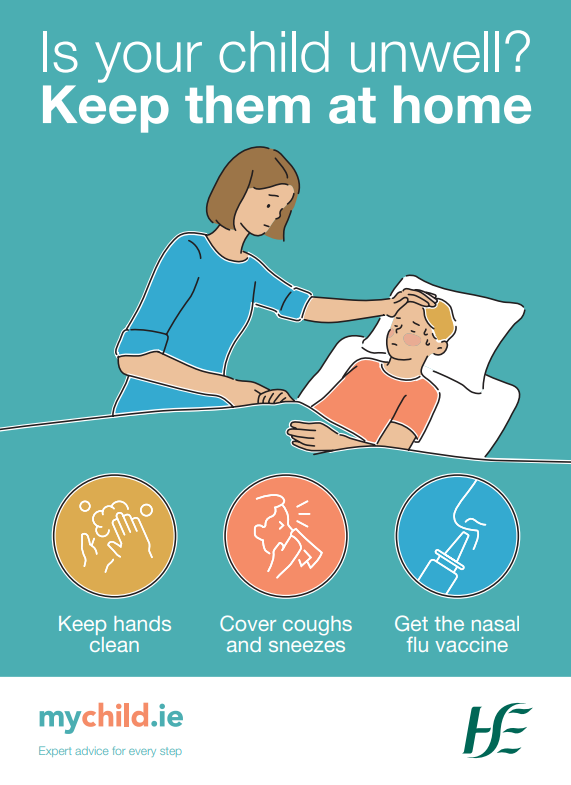Child Safeguarding
Our Child Safeguarding Statement has been published under documents. Please click below for quick access.
Child Safeguarding Statement
 Latest News
Latest News
- Details
We are opening enrollment for the 2024 - 2025 academic year from 8th January 2024. The link to the application form is below. Please fill in the application form in block capitols and return with the child's/children's birth certificate(s). Enrollment closes on Tuesday, February 29th 2024. Late applications will be processed on a case by case basis.
![]() Click here to download an application form for 2024-2025 academic year
Click here to download an application form for 2024-2025 academic year

- Details

TO: All Principals, for sharing with parents, guardians and staff
FROM: Dr Eamonn O’Moore, Director National Health Protection;
Dr Abigail Collins, National Clinical Lead Child Health Public Health
RE: Significant levels of Flu, Covid-19 and RSV currently circulating
DATE: 6th January 2023
Significant increase in viral infections
We have seen a very significant increase in the usual winter viral infections. This includes an increase in flu, RSV and now Covid-19. This is because we are all mixing together more.
We would like to thank you for supporting the dissemination of these important messages and thank the whole school community for their efforts in following public health advice. As schools and other activities re-open it is timely to remind the school community of the key measures outlined below.
Important messages for families and children regarding any infections:
1) The most important measure is to stay home if you are unwell.
Many children might have a runny nose or a slight cough in winter season. However, if a child is feeling unwell they should be at home. For example, they may have:
· Fever
· cough, and
· sore throat
They should stay at home until those symptoms have finished. Children unwell with symptoms of one infection are more likely to get ‘co-infected’ with another infection which might make them more unwell, if they are exposed.
See https://www2.hse.ie/conditions/colds-coughs-children/
Staying home when unwell will help prevent spread to other children, families and staff.
2) Infection, prevention and control measures
- - Cover coughs and sneezes
- - Keep hands clean
Many of the measures that we all got used to with Covid-19 are still important. Hygiene measures such as these should be encouraged for everyone. These measures help stop the spread of infection.
3) Vaccination
Making sure your child is up to date on all recommended vaccinations will help:
- - stop your child getting an infection and
- - make them less likely to be unwell if they do get an infection
Routine childhood vaccinations protect against many significant viral and bacterial infections.
More information is available at https://www2.hse.ie/babies-children/vaccines-your-child/
Flu vaccine
Children and young people with underlying conditions, are at increased risk of severe complications from flu and are recommended the flu vaccine.
It is important that all adults and children recommended the flu vaccine receive the vaccine. Check if you are recommended the flu vaccine at hse.ie/flu
It is not too late to get your free flu vaccine.
More information is available at
www2.hse.ie/conditions/flu/getting-the-vaccine/
Vaccination for Covid-19 is still available. Visit www2.hse.ie/screening-and-vaccinations/covid-19-vaccine/get-the-vaccine/children/
The most important ways to prevent the spread of all infections are making sure:
- anyone unwell stays at home
- children and adults are up to date with their recommended vaccines, including flu
4. If you are concerned about your child
If you are concerned your child may be unwell, please check https://www2.hse.ie/conditions/coldscoughs-children/ There is information on coughs, colds, fever, rashes and symptoms of concern. Advice on when to contact your GP or go to a hospital emergency department is available at
https://www2.hse.ie/babies-children/parenting-advice/caring-for-a-child/baby-child-seriouslyunwell/
Typical symptoms of viral infections
Symptoms of viral infections typically include:
- runny or blocked nose
- mild fever
- cough
- lethargy (tiredness)
Many children with viral infections also have a generalised rash.
Most children with viral infections can safely be cared for at home.
- Details
On Friday the 16th of December we held out School Chirstmas Show. All classes and children took part and they peformed to the highest standard and they produced and outstanding show. Here is a small selection of highlights from the show.

